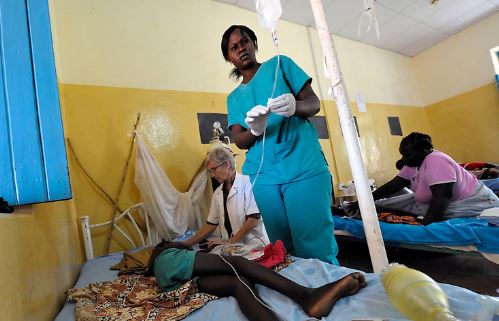Health workers at Wau’s main referral hospital in Western Bahr el Ghazal State have enumerated numerous challenges they face in the line of duty following repeated complaints by patients about poor services at the facility.
Some of the problems identified include the lack of drugs and no electricity at night.
In an interview with Radio Tamazuj on Monday, several health workers, including the nurses and midwives, said the poor working environment at the hospital is only getting worse.
Asunta Ballash Martin, a midwife who often works at night, said the absence of electricity at night forces them to use cell phones when delivering expectant mothers.
“The major problem is the issue of light at night, we use lighters and mobile phones because we do not have light and it is impossible for a midwife to do her work successfully without light,” she said. “As a teaching hospital, there must be a light. We also do not have equipment for operations.”
Another health worker, Charles Udo, highlighted the lack of transport for the workers.
“The staff on duty are supposed to be transported home at night and the administration should also provide fuel for the generator but these are not there,” he said. “Some of the sick people come without anything for their treatment from long distances in rural areas. They sometimes do not have money for their treatment.”
“Sometimes the administration only provides one jerrycan of diesel which cannot last long and sometimes we only use it during emergencies like during a surgical operation,” Udo added.
He said that when hospital administration does not have money to purchase fuel, they ask patients to provide fuel for surgical operations.
Many of the hospital’s staff also complained about a lack of salaries for months on end.
John Nhial said they have now gone ten months without getting their salaries which puts them in a difficult situation, especially in terms of managing their family affairs and paying school fees for their children.
“There is no money and we are now going to 10 months without salaries and we cannot even pay our children’s school fees,” he lamented. “We are now depending on selling our animals to pay school fees for our children.”
Another nurse, Natelina Mario, said she has worked for a long time at the hospital to look after her children but she is not getting her salary.
“I have spent a long period working in this hospital and the reason why I have chosen to work here is because of a condition. My husband is dead and left our children with me. I come to work so that I can be able to educate my children but the government is not thinking about us people,” she said. “I am a nurse and the government does not want to pay us, my children are orphans. I am not happy about this. Many of our colleagues left work for greener pastures but I did not go anywhere. I said I will not go anywhere and serve here but the government does not want to pay us.”
When contacted, the Director General of Wau Teaching Hospital declined to comment, saying he would not say anything because the poor working conditions at the hospital and the welfare of the staff are beyond the capacity of the state health ministry and the hospital’s administration.




